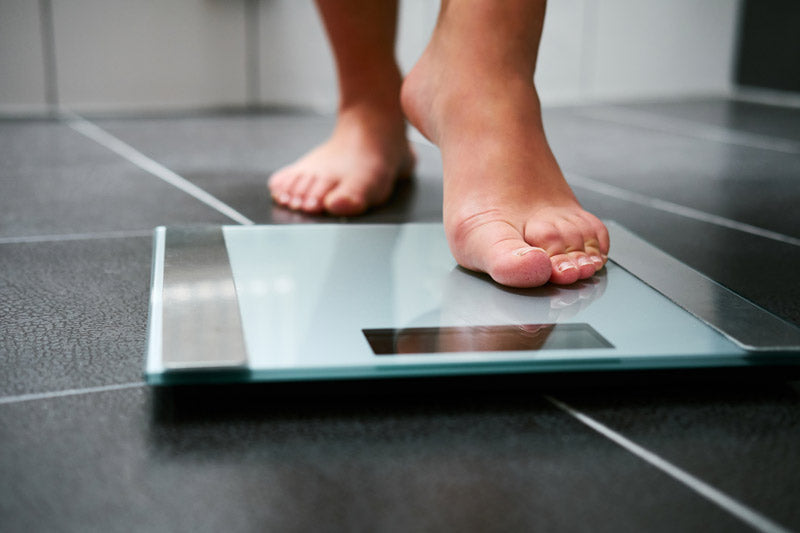Does Collagen Make You Gain Weight?

If you’ve noticed the numbers climbing up on the scales, you probably want to figure out why. As many of us know, excessive weight gain is associated with various chronic conditions, like heart disease and diabetes. Thus, it’s definitely something you want to get under control!
So, does collagen make you gain weight? Maybe you’ve recently started taking collagen powder daily. Is there an association between collagen and belly fat? In this article, we’re going to answer these questions and more.
What Happens If You Take Collagen Everyday?
Collagen is the most abundant protein in the human body, making up our ligaments, tendons, bones, muscles, and skin. Usually, consuming it is a good thing!
Collagen is shown to help:
- Improve skin elasticity and hydration
- With wound healing
- Reduce joint pain
- Enhance nail health and strength
- Decrease hair thinning
- Build muscle and bone
- Maintain a healthy weight
- Improve heart health
And more!
If you take collagen regularly everyday, it’s likely you’ll experience the above benefits. The truth is that our ancestors used to consume plenty of collagen through nose-to-tail eating where the whole animal was used. In the modern era, many of us simply don’t do this anymore. Instead, we hit up the grocery store and buy a steak or chicken breast, which doesn’t have high amounts of collagen content.
So, back to the main question: Can collagen cause weight gain?
Well, adding collagen shouldn’t necessarily result in that scale ticking upward. Rather, collagen should help you feel fuller for longer due to its satiating effects. With that in mind, let’s take a closer look at why weight gain often occurs.
Why Does Weight Gain Happen?
At the end of the day, weight gain occurs when you are consuming more calories than you are expending. Below, we detail the factors that can contribute to this.
1. Excess Caloric Intake

No, weight gain isn’t usually about eating that one “bad” food. After all, one “treat” or “cheat meal” will not cause you to gain large amounts of weight (if any). Usually, it’s about poor dietary choices again and again (more info here).
Many individuals opt for cheaper, processed, and pre-packaged foods to fill up their diets. However, many of these foods lack the nutrients your body needs and amps up the calories you consume. In fact, many of these pre-made meals pack close to 1000 calories, meaning it can be ultra-easy to consume 3000-4000 or more calories per day.
A pound of fat is equal to 3500 excess calories, meaning this can add up fairly quickly over weeks and months. The additional problem with eating all of these calories is that many people don’t expend even close to this amount. Most adults burn between 1600 to 2200 per day. And this leads us right into our next point!
2. A Sedentary Lifestyle
Thanks to technology, many manual tasks have become easy or completely obsolete. Instead, machines do many jobs for us. Yet, this has led a large majority of the population to lead a sedentary lifestyle. Many individuals go from desk work during the day to their couch at night.
This means that many of us don’t expend enough calories per day, especially if we opt for processed and pre-packaged food items or fast food.
Yet, for both sedentary behaviour and excess calories, it all comes down to your lifestyle habits. For instance, you can easily combat these by starting a regular strength training routine and making more meals from whole foods at home.
Strength training, combined with progressive overload, will help gain muscle, which burns more calories at rest than fat. Making more meals at home will help you know exactly what goes into your food and help you keep your caloric intake from climbing up.
3. Certain Health Conditions or Medications
On top of the above, but less common, some health conditions or medications can contribute to weight gain. For example, certain medications can increase appetite causing you to eat more.
Certain health conditions that may lead to weight gain further include hormonal imbalances, thyroid issues, and autoimmune conditions. If you have one of these concerns regarding your recent weight gain, we recommend discussing your options with your doctor.
Collagen and Weight Loss: Is There A Connection?
Surprisingly, collagen can actually play a vital role in weight loss and maintenance. Collagen has satiating effects, which can help you feel more full. In fact, many individuals when they first start taking collagen may complain of feeling overly full. This is because collagen is a protein, meaning it slows the absorption of sugar into the blood and slows digestion.
At the end of the day, when combined with a proper diet and exercise, collagen offers plenty of benefits for weight loss and maintenance.
Does Collagen Make You Retain Water?
You might have noticed that one of the benefits of collagen listed above was skin hydration. Collagen does, in fact, cause water retention, primarily in the skin. However, this retention is usually not enough to increase your bodyweight.
How To Incorporate Collagen As Part of A Healthy Lifestyle
Generally, it’s recommended to have between 2.5 to 15 grams of collagen per day. This can easily be added to smoothies, sauces, coffee, juices, soups, and more. Many people enjoy collagen as part of their morning coffee since it adds a bit of protein which can help manage blood sugar levels. But there’s more to health than just collagen! Below, we offer a few recommendations you can use to lose weight and maintain a healthy weight.
1. Strength Train Regularly

Strength training, as mentioned above, builds muscle. Muscle is often referred to as the “longevity organ” due to its immense health benefits. Muscle is known to reduce body fat, enhance immunity, decrease stress, and improve energy levels.
The key to building muscle with strength training is using progressive overload to continually challenge yourself. The body requires stimulus to add more muscle mass! Additionally, having collagen as part of your diet can help boost muscle in the body since muscle is made of protein.
2. Walk 10K Steps Each Day
There’s a reason this is the default setting on wearable devices, like the FitBit. The human body is made to move! Sitting all day at a desk simply doesn’t get you the activity your body needs to function optimally. Plus, walking is a great way to keep the weight off, enhance posture, and improve respiratory and cardiovascular health, minus any serious stress on your joints.
3. Decrease Stress in Your Life
Stress can frequently lead to binge eating and emotional eating. It can also cause us to reach for less-than-healthy food options. A few things you can do here to reduce the stress in your life:
- Say “no”
- Plan your time
- Make time for yourself
- Exercise (see the section above)
- Use relaxation techniques, like breathwork, progressive relaxation, or meditation, to unwind
4. Prioritise Your Sleep

According to various research, getting adequate quality sleep can contribute to weight loss and easy weight maintenance. Most adults need 7-9 hours of sleep per night. It can help to plan this time according to how much you usually need. Sleep can also be improved with regular bedtimes, sleeping in a cool, dark, and quiet room, and having a relaxing bedtime routine (i.e. avoiding looking at your phone 30 minutes before you nod off!.
5. Eat a Whole Foods Diet
At least 80% of your diet should consist of whole foods. This means adding more vegetables, fruits, and animal products, like eggs, cheese, and milk, to your diet. This may also mean making more meals at home. If you find this difficult, prepping your food ahead of time, such as on the weekend, can ensure you have easy and healthy go-to meals throughout your week and won’t be tempted by fast food or other convenient options.
Use Collagen to Improve Your Health!
Collagen won’t cause you to gain weight. Rather, it’s more about how many calories you're consuming and expending each day. The key to maintaining a healthy weight is incorporating healthy habits in your lifestyle—and having collagen each day, such as So Body Co’s Collagen Powder, can be part of this!